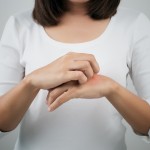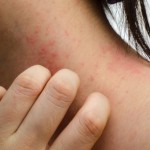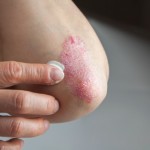


If you have ever experienced itchy, irritated skin, then you know how frustrating and uncomfortable it can be, so understanding the differences between skin diseases like psoriasis and eczema, and knowing how to go about treating the skin, can bring both physical and emotional comfort. See Psoriasis vs Eczema comparison table.
A rash is a noticeable change in the feel and color of the skin. Sometimes a rash can be due to an allergic reaction, for example, exposure to a chemical or a certain food. There are also skin diseases: psoriasis and eczema are two of the more common skin diseases. Both can cause itching, redness and a lot of discomfort, but are eczema and psoriasis the same?
While both diseases are autoimmune malfunctions, there are differences between eczema and psoriasis. With eczema skin becomes red, itchy and can include scales. Statistics show that about 31.6 million Americans have eczema. In cases of psoriasis there is overproduction of skin cells. These cells push to the outer layers of the skin faster than normal, so they don’t look like normal skin and instead appear red. They can be covered with a silvery, scaly crust. In the United States, approximately 7.5 million people suffer from psoriasis.
Difference between eczema and psoriasis. Download comparison chart (JPG)
 To differentiate between eczema and psoriasis, we have to look at the cause of the skin diseases. The easiest way to think about it is that psoriasis alters the way skin cells are made, while eczema increases their sensitivity to the environment. The root causes of eczema and psoriasis may stem from the immune system, but scientists have been able to uncover more about psoriasis than eczema.
To differentiate between eczema and psoriasis, we have to look at the cause of the skin diseases. The easiest way to think about it is that psoriasis alters the way skin cells are made, while eczema increases their sensitivity to the environment. The root causes of eczema and psoriasis may stem from the immune system, but scientists have been able to uncover more about psoriasis than eczema.
In psoriasis, the white blood cells, known as “T cells” attack a person’s own skin. This sets off a reaction that dilates blood vessels and seems to attract other white blood cells. What ends up happening is an increased production of skin cells that move too quickly to the surface, causing a red, scaly appearance. When it comes to eczema, it’s believed that a combination of hereditary and environmental factors are involved. Research shows that children are more likely to develop eczema if their parents had it or another atopic disease. Atopic diseases include asthma and dermatitis.
There is a difference between eczema and psoriasis when it comes to symptoms as well.
Psoriasis symptoms appear anywhere on the body, even the scalp, fingernails and toenails. Eczema tends to be on the hands, arms, elbows, ankles, knees, as well as the face and chest. People who have eczema almost always experience an itchy feeling, which is worse at night, but psoriasis isn’t always itchy. Some people with psoriasis go on to develop arthritis.
Studies show that specific environmental factors can trigger eczema symptoms. In some cases, if a person already has symptoms, environmental influences can make the skin disease worse.
The list below covers some of the common triggers:
In some people, infections can also set off eczema. Psoriasis shares this same trigger. Psoriasis can also be provoked by stress.
Here is a short list of other factors that can cause psoriasis to flare-up:
 There are other factors that differentiate eczema and psoriasis. Eczema tends to be a childhood skin disease. Many people outgrow the itchy, irritated skin as they move into their teens and early twenties; however, psoriasis tends to be more of an adult disease.
There are other factors that differentiate eczema and psoriasis. Eczema tends to be a childhood skin disease. Many people outgrow the itchy, irritated skin as they move into their teens and early twenties; however, psoriasis tends to be more of an adult disease.
While there can be emotional distress associated with eczema, it is more common with psoriasis. This is because the red appearance of the skin is pronounced and those who suffer from the condition are often embarrassed. They find it difficult to deal with stares and questions from people who don’t understand that it is simply a skin disease.
While people with eczema can get arthritis, it is not associated with the skin problem. However, there is a direct link between psoriasis and arthritis. In fact, it is called psoriatic arthritis.
 Knowing the difference between psoriasis and eczema is important so that you can receive the proper treatment. At times, similar treatment may be used, but it depends on each individual case.
Knowing the difference between psoriasis and eczema is important so that you can receive the proper treatment. At times, similar treatment may be used, but it depends on each individual case.
Topical ointments are often used on both eczema and psoriasis. Corticosteroid creams are prescribed for both skin diseases, but there are other types of topical medications that can also be administered for psoriasis, such as creams that contain vitamin D. It is important to differentiate between eczema and psoriasis medications because if you use the wrong one, it could lead to serious side effects.
Oral treatments can be used for both psoriasis and eczema, but they can have side effects and must be closely monitored by a doctor. The oral treatments for psoriasis are very different from those made available for eczema.
Generally speaking, dermatologists suggest that an anti-inflammatory diet, rich in leafy greens, fresh fruits and omega 3, is good for your skin. If you have a skin condition, it is best to try slowly eliminating different foods from you diet to see if that makes a difference. People with psoriasis should avoid spicy food, alcohol and coffee, while those with eczema seem to do better if they avoid allergenic food, such as shellfish or peanuts.
Here are a few natural remedies that can be applied for skin diseases like psoriasis and eczema.
 Warm bath – this helps you relax and de-stress. It also helps remove scales and calms irritated, inflamed skin. Adding Epsom salts can be effective.
Warm bath – this helps you relax and de-stress. It also helps remove scales and calms irritated, inflamed skin. Adding Epsom salts can be effective.When our skin is irritated, not only is it physically uncomfortable, it also impacts us emotionally. We simply don’t feel good about ourselves. Many people who suffer from skin diseases like psoriasis and eczema spend a lot of time avoiding social situations and finding ways to cover up. However, with the right support, including proper diagnosis and treatment, living with chronic skin problems doesn’t have to leave people feeling miserable.
If you notice an unusual change in your skin, don’t hesitate to contact your doctor. If he or she can’t pinpoint the skin condition right away, you will likely be referred to a dermatologist who can.
Get to know the symptoms and causes of psoriasis
Dry, itchy red patches on your body? You may be all too familiar with psoriasis, a painful and chronic condition where skin cells build up rapidly on the surface of the skin. Continue reading…
Natural remedies for eczema
Eczema, or atopic dermatitis, appears on the skin as a red rash and can be quite itchy. Eczema is a chronic condition with no cure, yet there are treatments to help reduce redness and soothe itchiness. Continue reading…
Sources:
http://dermatology-pc.com/eczema-vs-psoriasis-whats-difference/
https://nationaleczema.org/research/eczema-prevalence
http://www.medicalnewstoday.com/articles/14417.php#what_causes_eczema
http://www.webmd.com/skin-problems-and-treatments/psoriasis/psoriasis-or-eczema
http://www.mindbodygreen.com/0-12144/holistic-dermatology-5-tips-to-heal-psoriasis-eczema
http://www.belmarrahealth.com/symptoms-and-causes-of-psoriasis
http://www.belmarrahealth.com/natural-remedies-for-eczema
http://www.mayoclinic.org/diseases-conditions/eczema/basics/complications/con-20032073
Copyright © www.orthopaedics.win Bone Health All Rights Reserved